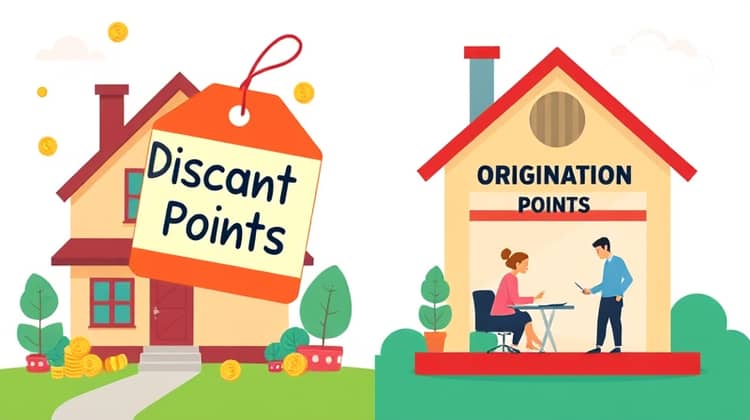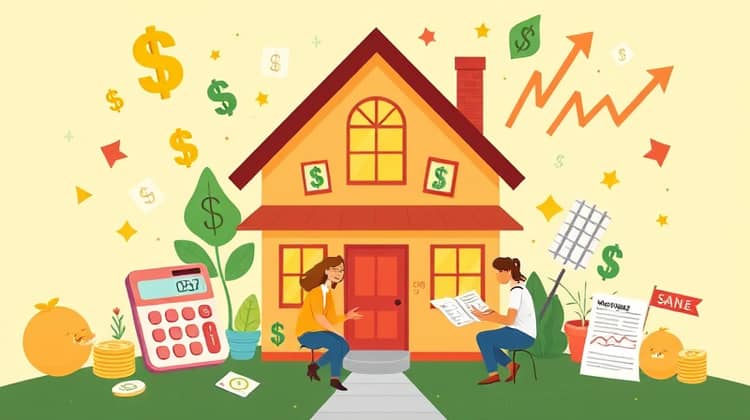In the world of home financing, understanding various costs and fees is essential for making informed decisions. One such cost that can significantly impact the overall price of a mortgage is mortgage points. These points are often overlooked by homebuyers but can offer considerable benefits when leveraged correctly. In this comprehensive guide, we will explore what mortgage points are, the different types available, and how and when they can be beneficial for homeowners.
Mortgage points can be a vital part of your mortgage strategy, allowing you to lower your long-term interest payments or gain immediate cash flow benefits, depending on your situation. The terminology and calculations involved in mortgage points can be somewhat confusing, but breaking it down into understandable parts can greatly enhance your financial planning for a home purchase. So let's dive deeper into the subject!
By the end of this article, you'll not only understand what mortgage points are but also how to calculate them and when it makes sense to buy. You'll be equipped with the knowledge to make sound decisions regarding mortgage costs and financing options.
Understanding Mortgage Points

Mortgage points are fees that homebuyers can pay directly upfront to lower the interest rate on their loan. Simply put, one point equals one percent of the mortgage amount. For example, on a $300,000 loan, one mortgage point would cost $3,000. While this may seem like a high initial cost, the long-term savings on interest payments can often make it worthwhile.
When you pay for points, you're essentially prepaying a portion of your interest. This means your monthly payments will be lower, which can significantly improve your cash flow. Although paying points can streamline your budgeting to some degree, it’s crucial to understand when this strategy may or may not work for you.
Homebuyers should analyze the trade-off between the upfront cost versus the monthly savings and consider how long they plan to stay in the home. If you're only planning to stay for a short period, it may not make sense to buy points, as it could take years to recoup upfront costs through lower monthly payments.
Types of Mortgage Points

There are primarily two types of mortgage points that borrowers need to be aware of: discount points and origination points. Understanding these terms can help you make better financial decisions throughout the loan process.
1. Discount Points
Discount points are paid to reduce your mortgage interest rate. By spending some money upfront in the form of points, you can save on your monthly mortgage payments and increase your potential cash flow each month. This is a straightforward way to see immediate benefits if you plan to stay in your home for an extended period.
Often, a point will decrease your interest rate by roughly 0.25%. However, this can vary based on the lender and financial market conditions. If the savings on your interest rate exceed the cost of the points over the life of the loan, then purchasing these points can be a wise financial decision.
- Lower monthly payments
- Put money down upfront to save over time
- Immediate benefits for long-term homeowners
In evaluating whether to buy discount points, it is essential to calculate how long it will take to break even on your investment. The breakeven point will help you determine if purchasing points is a sound financial strategy for your specific situation.
2. Origination Points
Origination points, on the other hand, are fees that lenders charge for processing your loan application. Unlike discount points, origination points are not applied to lower your interest rate; rather, they are upfront fees for the loan services provided.
Typically, origination fees can range from 0% to 2% of the loan amount, depending on the lender and the complexity of the loan. It is important to note that while you can negotiate origination points or fees, they are often less flexible than discount points.
- Compensation for the lender's work
- Not tied to your interest rate
- Can often be negotiated with lenders
When considering origination points, it's essential to weigh their cost against the level of service and support you'll receive from your lender. Be sure to compare offers from various lenders to get the best deal possible.
Why Use Mortgage Points?

There are several compelling reasons for considering mortgage points. One of the primary motivations is the potential for long-term savings. By purchasing points, borrowers can significantly lower their interest rates, which ultimately reduces total interest paid over the life of the loan. For individuals planning to stay in their homes for the long haul, this can make a huge difference in the total cost of borrowing.
Mortgage points can also lead to more manageable monthly payments. Instead of a steep payment each month, your budget can greatly benefit from the reduction in monthly expenses, allowing you to invest or save that money elsewhere. This feature can be especially beneficial for first-time homebuyers or those with tight budgets.
Finally, buying points can offer a unique opportunity for tax deductions. The IRS allows homebuyers to deduct the cost of points paid, provided certain conditions are met. This can offer substantial tax benefits depending on your financial situation, making it worthwhile to consider when evaluating your mortgage options.
Situations When Buying Points Makes Sense

Buying mortgage points can be a strategic decision under specific conditions, particularly for savvy homebuyers looking to maximize their savings. Recognizing these scenarios can help guide your choice when it comes to mortgage points.
Here are some situations when purchasing points might be beneficial:
- You plan to stay in your home long enough to reach the breakeven point.
- You have the cash available to pay for the points upfront without straining your finances.
- You want to lessen your overall interest payments to save in the long term.
Assessing your unique financial situation and long-term goals can help you determine whether buying points is the right choice for you and your family.
How to Calculate Mortgage Points

Calculating mortgage points involves a clear understanding of your mortgage amount and desired savings. To determine whether buying points is right for you, follow a straightforward formula. Generally, you will want to evaluate how much each point costs and the amount you would save on a monthly basis as a result of purchasing that point.
Here’s a simple way to calculate mortgage points:
- Determine the loan amount and the percentage of the cost of points you are considering.
- Calculate potential monthly savings from reduced interest rates due to purchasing points.
- Determine your break-even point by dividing the total cost of points by the monthly savings to find out how many months it will take to recoup your investment.
This calculation empowers you to make data-driven decisions regarding mortgage points, enabling you to weigh the costs against the potential benefits.
Potential Drawbacks of Mortgage Points

While mortgage points can offer several advantages, there are also drawbacks that borrowers should consider. Paying for points may mean a higher upfront cost, which could be difficult for some first-time homebuyers or those on a tight budget. This cost can take away from the cash reserves you may want for moving expenses or home improvements after purchasing.
Additionally, not every borrower will stay in their homes long enough to benefit from the reduced monthly payments that come from buying points. If you plan to sell the property or refinance the loan within a few years, the upfront cost may not pay off in the long run, making the points an unwise investment for some borrowers.
- Higher upfront costs may strain finances.
- Not beneficial for short-term homeowners or those planning to refinance soon.
- Risk of overpaying for points if not analyzed properly.
Understanding the potential drawbacks can help you make informed decisions and choose a mortgage strategy that aligns with your goals and timelines.
Final Considerations

As you navigate through the mortgage process, evaluating the advantages and disadvantages of mortgage points is essential. It's advisable to consider your long-term plans, financial stability, and how comfortable you feel with paying upfront costs versus enjoying lower monthly payments.
In conclusion, mortgage points can be a useful tool for savvy homebuyers, providing the potential for significant savings if utilized correctly. However, it's crucial to analyze your financial situation and your goals clearly before moving forward.














